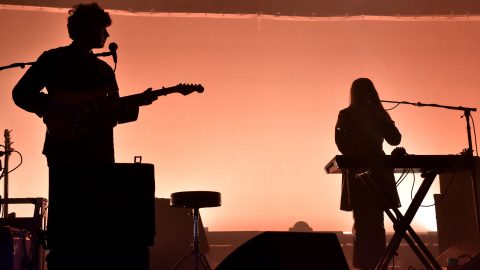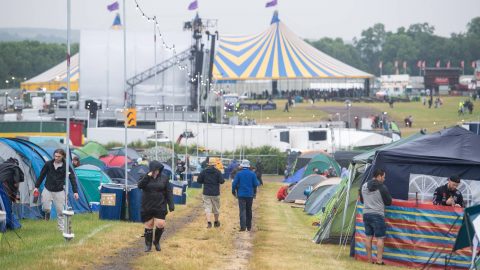NME Music News, Reviews, Videos, Galleries, Tickets and Blogs | NME.COM
For The Chateau – an LGBTQ+ venue in Camberwell – April was supposed to be a month of non-stop celebration. Back in the summer of 2018, the venue opened up shop in an empty basement space in south-east London, where it created a new destination for the queer community on a shoe-string. Even the decorations here are creatively repurposed – the multi-coloured stained glass windows originally decorated the place back when it was a religious-themed tapas and cocktail bar.
The Chateau quickly become an integral part of south east London’s queer scene, hosting parties, talks, performances, clubs and recitals. After two years, their time occupying the space is finally coming to an end, and the collective running the venue had planned to host a huge final send-off. Then along came lockdown.
“It’s been a really strange month for us,” admits the venue’s founder Laurie Belgrave. “The Chateau is this incredible project that grew from two months into two years, and it became something really significant in the south London queer scene. We had planned this big send-off for our final six weeks, and that has all kind of been swiped away. It has been a tough pill to swallow.”

It was a gutting blow for everyone involved, but instead of disappearing quietly, The Chateau is bouncing back. The venue has begun collecting tributes online from performers, DJs, staff members, and the community who came here – and hope to turn submissions into a commemorative project. Many of the events that were supposed to take place in the basement during its final month are moving online.
The Chateau’s recently live-streamed a version of their consistently chaotic club night U OK Hun during lockdown – handily, organisers live in a warehouse with a bunch of circus performers. “It’s a massive hot mess party, basically – and actually they did manage to recreate a lot of that feeling in the live stream,” says Belgrave. “There were go-go dancers, and rigging, with aerial performances.”
Another Chateau staple, Sugarush, took their pop and bubblegum night online. And beyond the partying – though there’s plenty of that taking place – you’ll find everything from virtual knitting groups, to a digital version of Birdie Fevvers’ Show and Tell chat-show. The show must – and will – go on.
Across the capital other LGBTQ+ venues, nights and collectives are all pulling together. The inability to connect in person has proved tough-going for all of us – particularly for the elderly people, for vulnerable people with underlying health conditions and healthcare workers who are exposed to the virus on a daily basis. Marginalised people in the queer community keenly feel that sense of isolation.
“It’s taken a pandemic to make parties more accessible” – Harry Gay
“We all head out to queer nights for the community and sense of belonging that comes with it,” says Harry Gay, a support worker at the LGBTQ+ homeless support charity The Outside Project. He acknowledges that he’s incredibly lucky to be on lockdown with friends but notes that “some people will be isolated on their own, or maybe even back with their birth families who might not accept their gender identity or sexual orientation.”
Before the crisis, Gay DJ’d at various events, and when bookings began to dry up last month, he and his housemates decided to start up Queer House Party. The premise was simple – they would stream sets from their house-share in exchange for tips. Thousands of people soon joined in, and it’s now a weekly event. “What started as a simple idea to create some extra cash during this crisis has turned into something so overwhelming, exciting, and important for our community,” he says.
Gay says that hosting Queer House Party – and having to figure out ways to adapt to putting on a club night without a physical space– has highlighted a lot of accessibility issues with existing venues around London.
“The biggest thing that has been brought to our attention is how [online] parties like ours are so much more accessible,” he points out. “Disabled people and people with access needs can pop in and join the party without having to worry about accessibility. Neurodivergent people can avoid sensory overload. Survivors can have a boogie and feel safe. Our sober siblings don’t have to worry about being around booze. These things really need to be addressed within the queer scene.:”
He adds: “It’s shit that it’s taken a pandemic to make parties more accessible but we will never be taking this stuff for granted again”.
Queer House Party has recently begun working with a British Sign Language interpreter to make the party more accessible to the deaf community. And in response to issues such as ‘Zoom-bombing’ (trolls disrupting video conferences, often to try and harass people) they have also partnered with the Good Night Out Campaign, an organisation that works to tackle harassment in nightlife. Together they’ve put together a guide to hosting safer online parties, which offers practical advice on implementing safe space policies over the internet and dealing with trolls who infiltrate events.
Just a few months ago Gal Pals were excited to start hosting their long-running night at a brand new, fully-accessible London venue for the first time. The queer dance party for womxn, trans and non-binary people celebrates its five-year anniversary in October. In March it became clear that IRL events were off the cards and so organisers Xandice Armah & Scarlett Langdon decided to get creative, inspired in part by other virtual events they had seen. Now Gal Pals have hosted three fortnightly parties so far, and the plan is to continue until the end of lockdown and beyond.
Speaking to NME in a joint statement via email, they explain: “LGBTQ+ folks have always needed ways to connect with the community online, but the need has increased because of our current circumstances.
“Many people have been forced into quarantine with family situations where they can’t be out and have been pushed back into the closet. Clubbing isn’t all there is to LGBTQ+ culture, but many people use this as a way to feel connected to their communities, so being able to see the people you see every month at Gal Pals on Zoom is surprisingly good at satisfying this need.”
Read more: The show must go online: inside the rise of virtual gigs during the coronavirus crisis
They add: “It’s a joy having something so fun to look forward to at the end of the week,” they add, “and it’s fantastic to finally be able to bring Gal Pals to countries that we’ve only dreamed of visiting.” After the lockdown period ends, they aim to continue with virtual parties into the future as standard practice. “Now that we’ve got streaming down, we would love to continue live streaming our club nights when we return to physical clubs, so that our communities can continue enjoying our parties online.”
The people behind Knickerbocker – a club night that takes place at The Yard in Hackney Wick, east London – were originally planning a fifth birthday party “of Biblical proportions“ over the recent bank holiday weekend.
DJs Aaron Zimbra and Alex Lawless were relieved when the government finally ordered all venues to close on March 20, but a few weeks into lockdown they began missing Knickerbocker regulars all the same. “It’s essentially a bizarre little family that meets every couple of months to make out and let off steam,” they explain via email. “That desire to let off steam right now is greater than ever – so we thought we’d host some sort of messy online gathering, that hopefully captures some of the atmosphere of the actual night.”
And so instead the party reappeared in a new online form – complete with some popular greatest hits (Robyn, LCD Soundsystem, SOPHIE) an experimental quiz segment, some ramshackle performances and – as they put it – “a well-chaired video conference with our peers”.
On top of that, Zimbra and Lawless are encouraging people to invite their mums along. “We are expecting a shonky and slightly anarchic couple of hours, with lots of people unsure of how and when to mute their microphones,” the Knickerbocker organisers told NME ahead of their first virtual party – which, we can confirm, was exceptionally shonky and anarchic.
“Queers have carved out private internet social spaces since the dawn of the net” – Aaron Zimbra
Pondering the popularity of queer virtual parties, and the sense of community they bring, Zimbra points out that the since the advent of the internet, online spaces have always played a big role in connecting people.
“Queer culture is first and foremost internet culture now,” he says. “Queers have been carving out private internet social spaces since the dawn of the net – MSN messenger, Myspace, Thingbox, Tumblr – and so to do a party online is just a natural extension of that, rather than necessarily a natural direction for a club night to go long-term.
“Alex [Lawless] is literally back staying in his teenage bedroom with his parents. It’s like being 16 again, and not old enough to go to clubs! It’s a miserable time and we really miss sweaty dance floors, and feeling the bass and the heat and our throbbing legs the morning after.”

He continues: “A lot of queer people face hardship in their life. It can be incredibly isolating to grow up queer, with many LGBTQ+ people being rejected by families or struggling to accept their own true identities. Many of us are dealing with mental health problems, fighting the state for hormones or living on the poverty line. when major crises hit, these marginalised people are always first and worst affected. The queer community has had to learn how to rally round and look out for each other.”
“That’s the resourcefulness of queers,” agrees The Chateau’s Laurie Belgrave. “We see that across our community, and often, it’s the way that we operate. We’re used to operating in the margins, with the resources that we have. The world has shifted on its axis,” he says. “We’ve got to make the best we can out of this situation.”
The post “Queer culture is internet culture now”: how the LGBTQ+ scene is making the best of lockdown appeared first on NME Music News, Reviews, Videos, Galleries, Tickets and Blogs | NME.COM.







